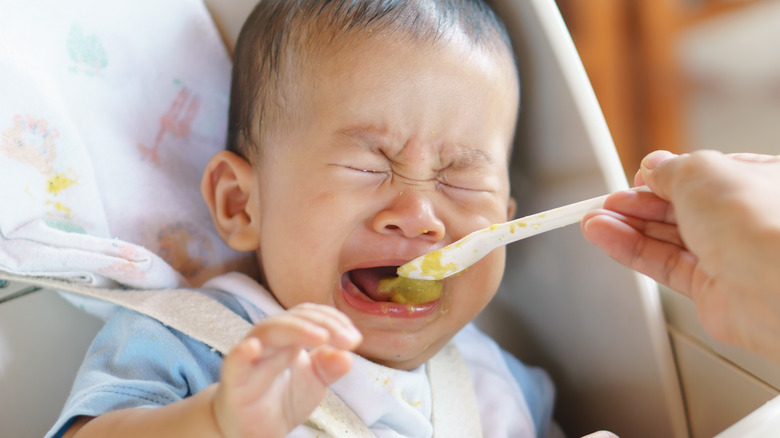This Might Be Why Your Baby Refuses To Eat
Children are notorious for being picky eaters, but when it comes to babies, their refusal to eat can leave you alarmed. While there's usually no reason to worry, there are a few reasons why your baby might be refusing to eat.
Babies usually start consuming solid foods around 4-6 months old, according to BabyCenter. They'll show signs that they're ready when they can hold their head up, sit upright, show significant weight gain, and can close their mouth around a spoon. They typically start with pureed foods and cereals. Eventually, they'll begin to show signs of readiness for finger foods around 8-12 months, including mastering the pincer grasp, transferring items from one hand to the other, swallowing food easily, and beginning to use a spoon. By 8 months, they'll often eat 3 meals a day, as well as snacks.
It's natural for kids to be sensitive to foods and have varying days of eating. When babies refuse to eat, it can be for a number of different reasons. Here are the most common.
Potential eating issues during infancy
For babies who nursed or are bottle-fed, positioning is important. They should be placed in a cross-cradle hold, and their heads should always be higher than the rest of their body (via MedicineNet).
A tongue-tie might be an underlying issue. This can happen when the tissue beneath the tongue doesn't separate as it should, keeping the tip of the tongue tethered to the floor of the mouth (via Mayo Clinic). This issue can be addressed by your pediatrician if it disrupts your child's eating behavior.
When an infant's nasal passages are blocked, it can make sucking on a nipple difficult or impossible as well, which may be a cause for concern (via Healthline). The transition from liquid to solid foods can often result in constipation, due to the intestinal tract needing to work harder to digest foods (via The Nourished Child). When babies are teething, the gums are often sore and swollen (via Healthline). This can often result in fussiness and loss of appetite. All of these potential issues can impact your baby's eating habits throughout infancy.
Bottom line: Should you be concerned?
It's totally normal for children's eating to vary by the day. In fact, according to the Centers for Disease Control and Prevention, a better way to gauge your child's habits is by looking at an entire week of eating rather than just a day. There's no real "normal" when it comes to kids' eating habits, and it can be hard to know how much food they should be getting on a given day.
However, reaching out to a medical professional is sometimes necessary, especially when a child's refusal to eat is accompanied by other symptoms (via Healthline). Call your doctor immediately if your child is losing weight, refuses to eat entire food groups, refuses to eat for several days, or has a fever.
In infants, you should contact your doctor immediately if your child goes without eating for over 4 hours, vomits after feeding, has bloody stool, is wheezing, or won't stop crying (via Healthline).



